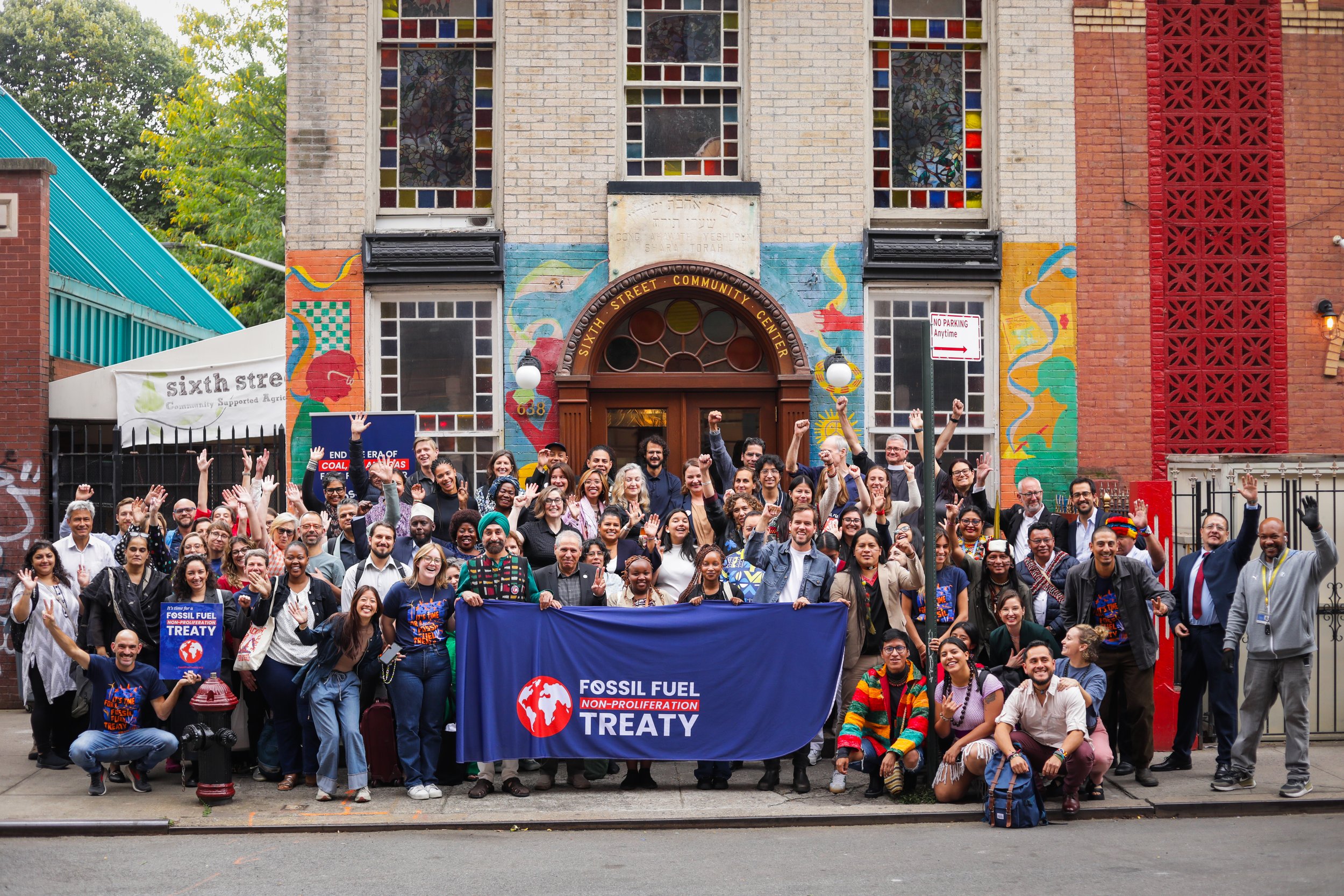2024 Wrapped
The Fossil Fuel Non-Proliferation Treaty Year in ReviewIn 2024, the Fossil Fuel Non-Proliferation Treaty Initiative achieved unprecedented milestones, strengthened global alliances, and built the foundation for transformative change. From regional breakthroughs to global endorsements, the year was marked by extraordinary progress.
Scaling New Heights: A Surge in Global Endorsements
2024 demonstrated the power of collective action as the Fossil Fuel Treaty gained unparalleled support across the globe:
Cities endorsing the Treaty: Starting the year with 101 endorsing cities, we ended with 123. These cities represent millions of people demanding a future free from fossil fuels and highlight the growing recognition of local governments’ vital role in combating the climate crisis.
Individual supporters: We now have more than 1 million individual supporters, showcasing the Treaty’s growing resonance with people from all walks of life. This milestone reflects the rising demand for meaningful climate action worldwide.
Organisations and institutions: With an additional 645 endorsements in 2024, we now have 3,846 organisations and institutions championing the Treaty, which underscores the role of civil society in driving systemic change.
National endorsements: The number of countries officially endorsing the Treaty grew from 12 to 16. These nations are stepping up as champions of a fossil-free future, paving the way for other governments to join the movement.
This remarkable growth demonstrates the increasing recognition that phasing out fossil fuels is a critical step in addressing the climate crisis and ensuring a just and equitable transition.
Spotlight Moments: Advancing the Movement
Regional Momentum in Latin America
In April, the Declaration of Choachí was published, uniting Latin American allies around a shared vision and strategies tailored to the region’s unique challenges. This pivotal moment strengthened the Treaty’s regional identity and culminated in a strong presence at UN Biodiversity COP16 in Colombia. Moving forward, we are developing a vibrant visual identity to reflect Latin America’s cultural richness and the urgency of its goals.Global Spotlight at the UN and Beyond
September was a standout month as the Treaty took center stage at high-profile global events. At the Global Citizen NOW summit, former UN Secretary-General Ban Ki-moon highlighted the Treaty’s alignment with the UN’s Pact for the Future and COP28’s push for fossil fuel phase-outs. His endorsement amplified calls for the Treaty in discussions at the UN General Assembly, demonstrating growing global recognition of the need to address fossil fuels head-on.Building Power Among Nations
The Treaty’s growing list of endorsing countries highlights its transformative potential. In 2024, two ministerial meetings brought together senior officials to explore the Treaty’s role in accelerating the transition to clean energy. With 16 nations on board and global support heating up, this movement’s rallying countries to back a game-changing complementary plan that supercharges the Paris Agreement and accelerates the shift to clean, sustainable energy for all.Knowledge Sharing
Recognizing the need for robust evidence, we published seven evidence-based reports in 2024. These resources are equipping policymakers, governments, and communities with the tools they need to advocate for a just transition. These resources underscore the importance of knowledge-sharing in driving informed, impactful climate action.African Leadership
August was an exciting month for momentum from Africa. Lilongwe, the capital of Malawi, became the first on the continent to endorse the Treaty, while Kenyan faith leaders from various traditions united to call for a fossil-free future. These endorsements reflect the growing recognition across Africa of the urgent need to act on fossil fuels.Capital Cities Leading the Way
In 2024, capital cities took center stage in the Treaty’s advocacy efforts. Seven capitals – Tirana, Copenhagen, Dublin, Castries, Kingston, Freetown, and Lilongwe – joined the movement, demonstrating the leadership required to drive systemic change. These endorsements represent a significant step forward in galvanizing global support.Social Media and Media Coverage Highlights
In a year of unprecedented engagement, the Treaty’s message resonated strongly across social and traditional media:Top social media posts: From Ban Ki-moon’s endorsement to Gustavo Petro’s address at COP16, our posts reached hundreds of thousands of viewers, bringing new supporters into the fold. One standout post, “No Deal is Better Than a Bad Deal,” garnered over 57 days of watch time, highlighting the power and resonance of the Treaty’s message.
Media coverage: With mentions in over 10,400 articles—an impressive 93% increase from last year—the Treaty’s presence in the media doubled its impact. Coverage spanned 37 languages and 35 countries, with significant stories in outlets like BBC and The Guardian.
These media highlights demonstrate the growing visibility of the Fossil Fuel Treaty as a critical solution to the climate crisis.
Looking Ahead
The momentum built in 2024 sets the stage for an even more impactful 2025. With your continued support, we aim to expand the movement further, rallying new allies and scaling up our efforts to phase out fossil fuels. Share the call for a Fossil Fuel Treaty within your community and help us turn this movement into a transformative force for global change.
Thank you for standing with us—together, we will make 2025 a year of unprecedented action!
